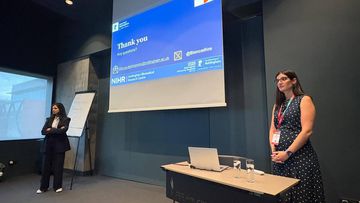Key thoughts and take-home messages from the CMSC 2023
NewsThis year's CMSC took place in Denver, Colorado in the USA and several MS specialist nurses and practitioners attended from across the UK, including our head of nursing Ruth Stross. Collectively, they have reflected on the key messages they felt were more relevant for the UK, and these are summarised here.
Their attendance was kindly funded by Novartis, and they were all extremely grateful to the company for this opportunity, highlighting how beneficial the conference was in meeting their educational needs and for developing professional relationships.
Our thanks go to Gillian Kamara, Bhawani Mainali, Melanie Sutcliffe, Michelle Davies, Krishna Shrestha, Makeda Best, Charlotte Thouless and Ruth Stross for their time in reflecting on these sessions and sharing their learning within the MS community.

From the packed programme, the group highlighted several areas as having been of most significance within the UK, and have summarised a few thoughts on these topics:
tackling health disparities and supporting ethnic minorities
future treatments in MS - BTK inhibitors
diagnosis and misdiagnosis
functional neurological disorder
understanding fatigue
Tackling health disparities
The need to tackle health disparities was the top take-home message as agreed by the whole group. Social determinants of health, ethnic background and gender identity can all contribute to health disparities, impacting service access, health outcomes or both. Neurologist Dr Mitzi Joi Williams and the National MS Society, USA, were among the inspirational speakers to present on this topic.
'This is not an area discussed in the UK much yet although it's needed; are these people with MS part of the 'forgotten many' that we talk about?'
Ruth Stross, head of nursing
There was clear evidence shared that MS can affect different ethnicities in different ways and that this needs factoring into assessment, treatment and management. For example, MS can present and progress differently in black people compared to white.
More mobility issues occur earlier post-diagnosis and there is a higher rate of visual impairment - indeed, rates of people with neuromyelitis optica (NMO) are higher amongst black people compared to white. Additionally, black people experience more extensive and active lesions in the brain, more rapid brain atrophy leading to increasing levels of cognitive impairment and fatigue and a rate of progression which is twice as fast - all leading to suggestions that black people experience a more severe course of disease than those from white populations.
Social determinants and gender have also been found to affect how people experience their MS and their access to support. Non-heterosexual orientation is a determinant factor in access to healthcare generally (Albuquerque 2016), and in MS specifically (Conte 2023).
'In general, individuals who are lesbian, gay, bisexual, transgender, queer or questioning, plus other identities (LGBTQ+) living with multiple sclerosis (MS) have less favorable healthcare experiences and poorer overall health than cisgendered heterosexual individuals. They may experience further challenges in addition to managing their MS, including psychological or emotional problems, and an increased risk of comorbid diseases and substance abuse.'
Conte, 'Podcast on the Challenges and Recommendations to Address Unmet Needs in MS for LGBTQ+ Populations in the United States', 2023
There is also evidence in the UK that social determinants of health affect MS-related outcomes (Dobson 2022) and are associated with a greater number of comorbidities and increased rates of hospitalisation (Straukiene et al 2021).
There are numerous barriers to treatment spanning engagement, discussions and decision-making and access with both patients and healthcare professionals experiencing difficulties in bridging this gap.
Understanding the health disparities which exist across the UK and recognising their impact is an important step towards overcoming some of these barriers. Understanding some of the cultural or social barriers people experience and providing relevant signposting may be one way to begin to address these disparities in your local area.
Support for people with MS from ethnic minorities
Here are some important links for people with MS:
We Are ILL developed by a black woman with MS for black communities
ACTRIMS 2023: Documentary offers hope for Black MS community
- National MS Society USA conference in June sessions including:
How Multiple Sclerosis Affects the Hispanic/Latinx Community
Ethnicity and multiple sclerosis - moving beyond preconceptions (ACNR)
How can we improve MS care for people from ethnic minority backgrounds? (UK MS Society)
Other important take-aways
Future treatments
There was a lot of excitement around new treatment options being explored in MS, namely the use of Bruton's Tyrosine Kinase (BTK) inhibitors. This novel treatment can cross the blood-brain barrier and affect a wide variety of immune cells, including B cells, NK cells, and microglia, which all play major roles in MS inflammation. BTK inhibitors’ effect on microglia is particularly promising for managing progression independent of relapse (PIRA) and progressive MS (Kramer 2023; Shneider 2022).
Evidence suggests that progressive MS is driven by cells from within the central nervous system (CNS) such as microglia and astrocytes rather than peripheral immune cells. A range of studies are currently underway assessing the safety, dosing and efficacy of these treatments (Kaplan & Miravalle 2023).
This short video from Neurology Live features Dr Amit Barr-Or talking at the CMSC on this topic, for more information.
Diagnosis and misdiagnosis
Rates of misdiagnosis of MS are reasonably high (Brownlee & Solomon 2021; Solomon 2021); around a quarter of neurologists are thought to have misdiagnosed a person as having MS. Dr Andrew Solomon presented startling information around MS misdiagnosis with rates of people being misdiagnosed with MS ranging from 7% to 18% which commonly remains misdiagnosed for some time. He noted that in a study of 110 patients misdiagnosed with MS, 33% had a misdiagnosis persisting for over 10 years, and 29% had used a disease-modifying therapy (DMT) unnecessarily for over 10 years - something which carries risk of developing progressive multifocal leukoencephalopathy (PML). Another study found that women were at an 83% greater risk of receiving an incorrect diagnosis of MS and that each year of increased age increased risk of misdiagnosis by 8% (Argentina study).
Despite regular revisions to the McDonald diagnostic criteria (2017), many clinicians including neurologists have difficulty applying these diagnostic criteria in clinical settings with specific issues around MRI imaging interpretation. Andrew argued that improved biomarkers may help reduce misdiagnosis rates (Wandersee 2023) although at present, neurofilament light (NfL) markers are most studied and do not differentiate between MS and other causes of neuronal death (Ferreira-Atuesta 2021).
Functional neurological disorder (FND)
Being addressed for the first time at the CMSC, the challenges of diagnosing FND and MS were highlighted. Often one is misdiagnosed as the other, whilst the two are commonly comorbid (Walzl 2022).
'It was explained that FND is predominantly a problem of the 'software' system, whilst MS is the 'hardware'. It was probably termed as hysteria in previous years.'
Michelle Davies
Core aspects to apply in practice were the importance of understanding FND and ensuring that any patient with a diagnosis of it understands the condition as well. Remembering that the symptoms are significant and impactful to the patient and to ensure they are supported with appropriate treatment.
(For more information on FND, Sheffield Teaching Hospital has a good information section here.)
Understanding fatigue
Fatigue is one of the most common symptoms experienced by people with MS and often cited as one of the most disabling (Braley 2010). At the CMSC, discussions were around defining and measuring fatigue and its mutli-dimensional nature, how to ask people with MS about their fatigue, and whether MS fatigue is different to fatigue experienced in other conditions.
The crossover between fatigue and cognitive processing was highlighted, as was the relationship between decreased social interaction and increased perception of fatigue. Motivation appears impacted by fatigue, so whilst aerobic exercise has been found positive in treating fatigue and cognition (Torres-Costoso 2022), using this form of treatment may be particularly challenging. Lower levels of dopamine are found in the basal-ganglia of those with MS (Melnikov 2021) and so discussion turned to activating the motivational loop through dopaminergic mechanisms, both pharmacological and therapeutic, as a means of treating fatigue in the future.
In summary
Each member of the group highlighted the value they had found in the softer elements of the conference, meeting others, sharing learning, and building relationships, as much as in the sessions themselves.
Each is keen to examine their personal practice to see where these take-home messages can impact their local service, whether through improving signposting and support for people from different ethnic backgrounds when diagnosed with MS, to having a greater awareness of FND, to reviewing fatigue management. Through small tweaks to daily clinical practice, these big international messages can have a small but significant impact on those with MS living in the UK.

Gillian Kamara, Krishna Shrestha, Michelle Davies, Bhawani Mainali, Makeda Best
Novartis had no input into any aspect of this summary article.
Related articles
Encouraging excellence, developing leaders, inspiring change
MS Academy was established in 2016 and in that time has accomplished a huge amount with exciting feedback demonstrating delegates feel inspired and energised along their personal and service development journeys. The various different levels of specialist MS training we offer are dedicated to case-based learning and practical application of cutting edge research.


